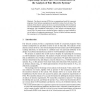Free Online Productivity Tools
i2Speak
i2Symbol
i2OCR
iTex2Img
iWeb2Print
iWeb2Shot
i2Type
iPdf2Split
iPdf2Merge
i2Bopomofo
i2Arabic
i2Style
i2Image
i2PDF
iLatex2Rtf
Sci2ools
TACAS
2005
Springer
2005
Springer
Separating Fairness and Well-Foundedness for the Analysis of Fair Discrete Systems
Fair discrete systems (FDSs) are a computational model of concurrent programs where fairness assumptions are specified in terms of sets of states. The analysis of fair discrete systems involves a non-trivial interplay between fairness and well-foundedness (ranking functions). This interplay has been an obstacle for automation. The contribution of this paper is a new analysis of temporal properties of FDSs. The analysis uses a domain of binary relations over states labeled by sets of indices of compassion requirements. The use of labeled relations separates the reasoning on well-foundedness and fairness.
Related Content
| Added | 28 Jun 2010 |
| Updated | 28 Jun 2010 |
| Type | Conference |
| Year | 2005 |
| Where | TACAS |
| Authors | Amir Pnueli, Andreas Podelski, Andrey Rybalchenko |
Comments (0)

